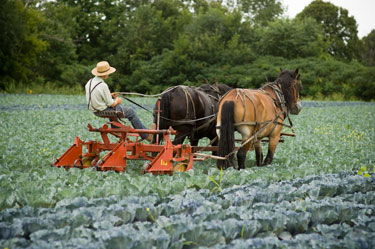Food and Faith: Agriculture as a Theological Act
By Kent Hayden, M.Div. | Aug 27, 2010

Wendell Berry has said that eating is an agricultural act. I have always suspected that agriculture is a theological act. The way we produce and consume something as basic as our food not only determines our physical and environmental health but is a reflection of our social health and a contributing factor of our spiritual health. This is an idea that should disturb and excite us. If eating is agricultural and agriculture is theological, then right eating is a sign of faith, and unjust, aesthetically bankrupt eating endangers the soul.
I have suspected this connection since my grandfather washed his farm-calloused hands in holy water to baptize my infant head. My memories of the rattling of
Grandpa’s tractor are mixed with those of the booming of his preaching. I always imagined there was a link between the strength of his faith and the strength of his milker’s grip. But for the first 25 years of my life, these loosely held notions remained in the background of my thinking and living. I was discontented with both the fast food and fast religion of our society. I gave up both, but was only rewarded with the occasional surge of self-righteousness as I passed by a burger joint hungry or turned off a radio sermon pessimistic. I knew that the easy food and easy religion that I had used to fuel my body and my soul for most of my life were bad for me. But I thought fasting was the only solution.
By the time I graduated from seminary, I was beginning to see signs of hope in our public discourse. People were talking about food and farming in meaningful ways. People were raising their voices in support of a religion that got its hands dirty. I came to possess the dangerous combination of optimism, conviction, and discontent that sometimes leads to an adventure. I was craving a meaningful way of life, which neither my years of consuming nor fasting had provided, and
I suspected that the best place to look was in the very garden from which our food choices had excluded us long ago. I applied for an internship on a little organic farm in Washington state, packed up some clothes, a tent, and my dog, and hit the road.
For the past three weeks, I have been living, working, and eating with dirty hands. In those three weeks, I have showered a total of six times, blistered my hands five, watched 21 sunsets and 15 sunrises, lain under a garden sprinkler twice, floated down the Yakima river three times, and sunburned my neck too often to mention. I have been stopped short by beauty every day, and I have fallen asleep contented every night.
The spiritual abundance I have enjoyed while living with a sore back and blistered hands cannot be explained by the food I have eaten. I have eaten well before.
It is not due to the awe I have experienced. I have been immersed in beauty before. It grows from the blisters and the aches themselves, earned in pursuit of a simple good thing. It is the result of reordering my understanding of “the good” to include struggling against and overcoming the benevolent afflictions of early mornings and long, hot days. The solution to the discontent of a fast food culture and a fast food religion is not just a rejection of the fruit of these societal trends. It is a total metanoia; a mind-turning towards a theological and culinary aesthetic that includes both difficulty and satisfaction as parts of the good. Our preachers must proclaim the complex mix of the painful and sublime that constitutes the true beauty of creation. Our faith communities must invite us into this beauty, by tearing down the white picket fences we have built between our self-referential good and evil. We must open up new fields for working and growing, and put ourselves to the difficult task of relationship building. Likewise, our food system must reclaim the value and dignity of hard work by connecting consumers to producers through community gardens, CSAs, and local, seasonal eating. We must demand that “fair trade” ceases to be a luxury, so that when we meet the men and women whose hands have given us our daily bread, we might look them in the eye and smile. We must relearn the bent-backed posture of farming, and with it, the bent-backed posture of prayer.
Read more: http://www.huffingtonpost.com/kent-hayden-mdiv/food-and-faith-agricultur_b_662529.html















